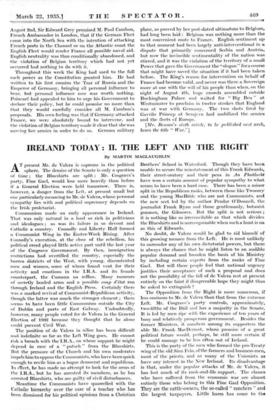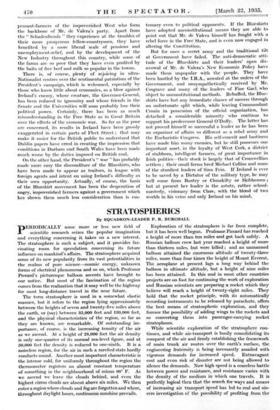IRELAND TODAY : H. THE LEFT AND THE RIGHT
By MARTIN MACLAUGHLIN
AT present Mr. de Valera is supreme in the political sphere. The demise of the Senate is only a question of time ; the Blueshirts arc split ; Mr. Cosgrave's party, Fine Gael, would lose more heavily than before if a General Election were held tomorrow. There is, however, a danger from the Left, at present small but one particularly menacing to Mr. de Valera, whose personal sympathy lies with and political supremacy depends on the Irish proletariat.
Communism made an early appearance in Ireland. That was only natural in a land so rich in politicians and ideologues ; as was its failure in so devout and Catholic a country. Connolly and Liberty Hall formed a Communist Wing in the Easter-Week Rising. After Connolly's execution, at the close of the rebellion, his political creed played little active part until the last year of the Cosgrave Government. By then, immigration restrictions had overfilled the country, especially the barren districts of the West, with young, discontented men and women, some of whom found vent for their activity and emotions in the I.R.A. and its female counterpart, the Cumann na mBan. Many rumours of secretly landed arms and a possible coup d'etat ran through Ireland and the English Press. Certainly there was a marked revival of Communist-Republican activity, though the latter was much the stronger element ; there seems to have been little Communism outside the City of Dublin and parts of East Galway. Undoubtedly, however, many people voted for de Valera in the General Election of 1932 because they thought that he alone could prevent Civil War.
The position of de Valera in office has been difficult and indefinite so far as the Left Wing goes. He cannot risk a breach with the I.R.A., on whose support he might depend in case of a " putsch " from the Blueshirts. But the pressure of the Church and his own moderates impels him to oppose the Communists, who have been quick enough to revile him as a bogus democrat and republican. In effect, he has made no attempt to look for the arms of the I.R.A., but he has arrested its members, as he has arrested Blueshirts, who are guilty of civil disturbances.
Meantime the Communists have quarrelled with the Catholic hierarchy over the case of a teacher who has been dismissed for his political opinions from a Christian Brothers' School in Waterford. Though they have been unable to secure the reinstatement of this Frank Edwards, their street-oratory and their pens in An Phoblacht have won a certain amount of popular sympathy to what seems to have been a hard case. There has been a minor split in the Republican ranks, between those like Twomey and the young MacBride who are not Communists, and the new sect led by the author Peadar O'Donnell, the journalist Frank Ryan and those gentlemanly, botanist gunmen, the Gilmores. But the split is not serious ; it is nothing like so irreconcilable as that which divides the Blueshirts and is unrecognizable when such a hunt is on as this of Edwards.
No doubt, de Valera would be glad to rid himself of this growing menace from the Left. He is most unlikely to surrender any of his own dictatorial powers, but there is always the chance that he might listen to an audible popular demand and broaden the basis of his Ministry by including certain experts from the ranks of Fine Gael. But will these people feel that national urgency justifies their acceptance of such a proposal and does not the possibility of the fall of de Valera rest at present entirely on the faint if disagreeable hope they might thus be asked to extinguish The Opposition from the Right is more numerous, if less ominous to Mr. de Valera than that from the extreme Left. Mr. Cosgrave's party controls, approximately, two-fifths of the Dail and has a majority in the Senate. It is led by men ripe with the experience of ten years of busy and relatively prosperous government. Besides the former Ministers, it numbers among its supporters the able Mr. Frank MacDermot, whose promise of a great political future would, perhaps, be still more certain if he could manage to be less often out of Ireland.
This is the party of the men who formed the pro-Treaty wing of the old Sinn Fein, of the farmers and business-men, Most of the priests, and as many of the Unionists as have any interest in the New Ireland. Its disadvantage is that, under the popular attacks of Mr. de Valera, it has lost much of its rank-and-file support. The classes who have suffered from the economic war are almost entirely those who belong to this Fine Gael Opposition. They are the cattle-owners, the so-called " ranchers " and the largest taxpayers. Little harm has' come to the peasant-farmers of the impoverished West who form the backbone of Mr. de Valera's party. Apart from the " Sehadenfreude " they experience at the troubles of their more prosperous fellow-countrymen, they have benefited by a more liberal scale of pensions and unemployment-relief, and by the development of the New Industry throughout this country, while some of the farms are so poor that they have even profited by the baits of free beef and milk so popular in the towns..
There is, of course, plenty of rejoicing in ultra- Nationalist centres over the sentimental patriotism of the President's campaign, which is welcomed, especially by those who know little about economics, as a blow against Ireland's enemy, whose creature, the Governor-General, has been reduced to ignominy and whose friends in the Senate and the Universities will soon probably lose their political power. Certainly, there has been as much misunderstanding in the Free State as in Great Britain over the effects of the economic war. So far as the poor are concerned, its results in Ireland have been grossly exaggerated in certain parts of Fleet Street ; that may make it easier for the British public to understand that Dublin papers have erred in creating the impression that conditions in Durham and South Wales have been made much worse by the duties imposed on British coal.
On the other hand, the President's " war " has probably made more easy the discomfiture of the Blueshirts, who have been made to appear as traitors, in league with foreign agents and intent on using Ireland's difficulty as their own opportunity. Actually, of course, the basis of the Bhieshirt movement has been the desperation of angry, impoverished farmers• against a government which has shown them much less consideration than is cus- tomary even to political opponents. If the Blueshirts have adopted unconstitutional means they are able to point out that Mr. de Valera himself has fotight with a rebel force in the Free State; and is even now engaged in altering the Constitution.
But for once a secret army and the traditional tilt at Government have failed. The anti-democratic atti- tude of the Blueshirts and their leaders' Open dis- avowal of Mr. de Valera's New Economic Policy have made them unpopular with the people. They have been hustled by the arrested at the orders of the Government, and unsympathetically received by Mr. Cosgrave and many of the leaders of Fine Gael, who object to unconstitutional methods. Rebuffed, the Blue- shirts have lost any immediate chance of success through an unfortunate split which, while leaving Commandant Cronin in possession of the official organization, has detached a considerable minority who continue to support his predecessor General O'Duffy. The latter has not proved himself so successful a leader as he has been an organizer of affairs so different as a rebel army and the Eucharistic Congress. His self-conceit and hastiness have made him many enemies, but he still possesses one important asset, in the loyalty of West Cork, a district of stubborn, intelligent farmers, of great importance in Irish politics—their stock is largely that of Cromwellian settlers ; their small farms bred Michael Collins and some of the sturdiest leaders of Sinn Fein. If Ireland is ever to be saved by a Dictator of the military type, he may well come from Bantry or Clonakilty or Skibbereen ; but at present her leader is the astute, rather school- masterly, visionary • from -Clare,- with the blood of two worlds in his veins and only Ireland on his mind.





























































 Previous page
Previous page